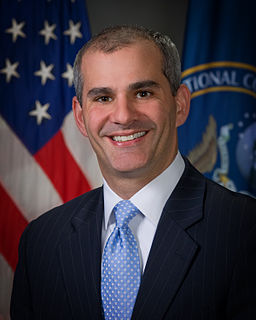A Quote by Toomas Hendrik Ilves
Digital warfare, in the Clausewitz definition as 'the continuation of policy by other means,' reached Western public consciousness via my own country, Estonia, in 2007 when our governmental, banking, and news media servers were hit with 'distributed denial-of-service attacks,' which is when hackers overload servers until they shut down.
Related Quotes
Secretary Clinton used several different servers and administrators of those servers during her four years at the State Department and used numerous mobile devices to view and send e-mail on that personal domain. As new servers and equipment were employed, older servers were taken out of service, stored, and decommissioned in various ways.
If you begin acting contrary to the public's interest, and there is no alternative governmental model, with which you're willing to engage, we, the people, will have to put forth our own extra governmental models and methods of trying to restore the balance of liberty to the liberal tradition of Western society.
Social media is important, but it does not bring down governments. Governments can shut down the Internet. Governments can control media access. If they do what the Tunisians did and try and negotiate with the opposition, then the media's still open, the international community can learn what's happening in the country, and then that can provide inspiration. But in mid-2009, the Iranian regime just shut down the Internet. Facebook went dark. Twitter went dark. BBC Persian, Voice of America, Persian News Network all went dark. That was it.
As the president of Estonia, I represent the only truly digital society which actually has a state; almost all our citizens' interactions with the government, including voting, can be done securely online, and our 'e-residents' can incorporate and run their businesses in Estonia without ever having to set foot here.
My definition of media? 'Anything which owns attention.' This could be a game or, perhaps, a platform. Ironically, the media tends to associate media with publishing - digital or otherwise - which, in turn, is too narrow a way to consider not only the media but also the reality of the competitive landscape and media-focused innovation.

































